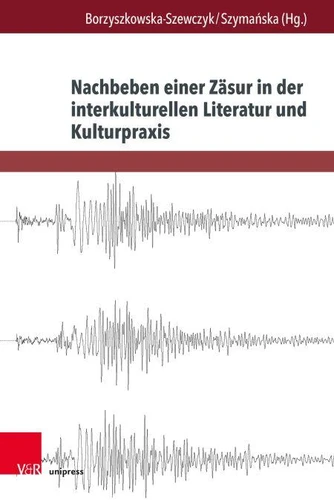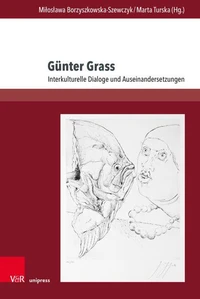Nachbeben einer Zäsur in der interkulturellen Literatur und Kulturpraxis. Formationserlebnisse einer Umbruchsgeneration
Par : , , , ,Formats :
Disponible dans votre compte client Decitre ou Furet du Nord dès validation de votre commande. Le format PDF est :
- Compatible avec une lecture sur My Vivlio (smartphone, tablette, ordinateur)
- Compatible avec une lecture sur liseuses Vivlio
- Pour les liseuses autres que Vivlio, vous devez utiliser le logiciel Adobe Digital Edition. Non compatible avec la lecture sur les liseuses Kindle, Remarkable et Sony
 , qui est-ce ?
, qui est-ce ?Notre partenaire de plateforme de lecture numérique où vous retrouverez l'ensemble de vos ebooks gratuitement
Pour en savoir plus sur nos ebooks, consultez notre aide en ligne ici
- Nombre de pages275
- FormatPDF
- ISBN978-3-8470-1659-5
- EAN9783847016595
- Date de parution04/12/2023
- Protection num.pas de protection
- Taille4 Mo
- Infos supplémentairespdf
- ÉditeurV&R Unipress
Résumé
1989/90 markiert den Beginn einer neuen politischen, geschichtlichen und gesellschaftlichen Ära in Europa. Je nach geopolitischem Blickwinkel wird dieser unterschiedlich akzentuiert und mit verschiedenen Prozessen und Ereignissen in Verbindung gesetzt. Als wichtige Akteur*innen des Diskurses zur Neuordnung und zugleich als Kultur(ver)mittelnde innerhalb Europas treten u. a. Kulturschaffende und die Schriftsteller*innen auf, die aus dem mittel- bzw.
osteuropäischen Raum stammen und deren Texte der interkulturellen Literatur zugeordnet werden können. Die Beiträger*innen diskutieren interdisziplinär, wie die relevanten Themen der Gegenwart, wie etwa literarische und außerliterarische Repräsentationen von Migration und Flucht, Identität und Differenz, multiple Zugehörigkeiten im Spannungsfeld zwischen Nationalität und Transnationalität sowie zwischen Ost und West in der Literatur und der kulturellen Praxis polyphon reflektiert werden. The caesura 1989/90 marks the beginning of a new era in Europe, as understood in political, historical and social terms.
Depending on the geopolitical perspective, it is associated with different processes and historical events and the emphasis is distributed varyingly. Significant actors in the discourse on the new order include those writers from Central and Eastern Europe whose texts can be categorised as intercultural literature. The contributors engage in an interdisciplinary dialogue, raising questions on how literature and cultural practice reflect on such important contemporary topics as migration and refugeeism, identity or differentiation, a sense of belonging constituted in the field of tension arising between nationality and transnationality, between East and West.
osteuropäischen Raum stammen und deren Texte der interkulturellen Literatur zugeordnet werden können. Die Beiträger*innen diskutieren interdisziplinär, wie die relevanten Themen der Gegenwart, wie etwa literarische und außerliterarische Repräsentationen von Migration und Flucht, Identität und Differenz, multiple Zugehörigkeiten im Spannungsfeld zwischen Nationalität und Transnationalität sowie zwischen Ost und West in der Literatur und der kulturellen Praxis polyphon reflektiert werden. The caesura 1989/90 marks the beginning of a new era in Europe, as understood in political, historical and social terms.
Depending on the geopolitical perspective, it is associated with different processes and historical events and the emphasis is distributed varyingly. Significant actors in the discourse on the new order include those writers from Central and Eastern Europe whose texts can be categorised as intercultural literature. The contributors engage in an interdisciplinary dialogue, raising questions on how literature and cultural practice reflect on such important contemporary topics as migration and refugeeism, identity or differentiation, a sense of belonging constituted in the field of tension arising between nationality and transnationality, between East and West.
1989/90 markiert den Beginn einer neuen politischen, geschichtlichen und gesellschaftlichen Ära in Europa. Je nach geopolitischem Blickwinkel wird dieser unterschiedlich akzentuiert und mit verschiedenen Prozessen und Ereignissen in Verbindung gesetzt. Als wichtige Akteur*innen des Diskurses zur Neuordnung und zugleich als Kultur(ver)mittelnde innerhalb Europas treten u. a. Kulturschaffende und die Schriftsteller*innen auf, die aus dem mittel- bzw.
osteuropäischen Raum stammen und deren Texte der interkulturellen Literatur zugeordnet werden können. Die Beiträger*innen diskutieren interdisziplinär, wie die relevanten Themen der Gegenwart, wie etwa literarische und außerliterarische Repräsentationen von Migration und Flucht, Identität und Differenz, multiple Zugehörigkeiten im Spannungsfeld zwischen Nationalität und Transnationalität sowie zwischen Ost und West in der Literatur und der kulturellen Praxis polyphon reflektiert werden. The caesura 1989/90 marks the beginning of a new era in Europe, as understood in political, historical and social terms.
Depending on the geopolitical perspective, it is associated with different processes and historical events and the emphasis is distributed varyingly. Significant actors in the discourse on the new order include those writers from Central and Eastern Europe whose texts can be categorised as intercultural literature. The contributors engage in an interdisciplinary dialogue, raising questions on how literature and cultural practice reflect on such important contemporary topics as migration and refugeeism, identity or differentiation, a sense of belonging constituted in the field of tension arising between nationality and transnationality, between East and West.
osteuropäischen Raum stammen und deren Texte der interkulturellen Literatur zugeordnet werden können. Die Beiträger*innen diskutieren interdisziplinär, wie die relevanten Themen der Gegenwart, wie etwa literarische und außerliterarische Repräsentationen von Migration und Flucht, Identität und Differenz, multiple Zugehörigkeiten im Spannungsfeld zwischen Nationalität und Transnationalität sowie zwischen Ost und West in der Literatur und der kulturellen Praxis polyphon reflektiert werden. The caesura 1989/90 marks the beginning of a new era in Europe, as understood in political, historical and social terms.
Depending on the geopolitical perspective, it is associated with different processes and historical events and the emphasis is distributed varyingly. Significant actors in the discourse on the new order include those writers from Central and Eastern Europe whose texts can be categorised as intercultural literature. The contributors engage in an interdisciplinary dialogue, raising questions on how literature and cultural practice reflect on such important contemporary topics as migration and refugeeism, identity or differentiation, a sense of belonging constituted in the field of tension arising between nationality and transnationality, between East and West.




